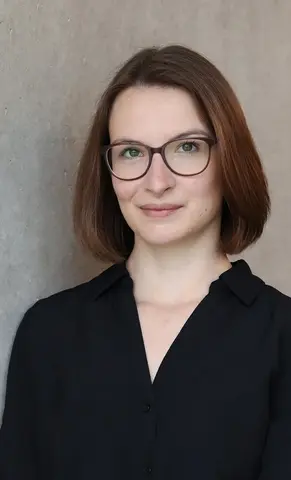Ann-Katrin Preis, M.A.
ann-katrin.preis@uni-erfurt.deLecturer ('Wissenschaftliche Mitarbeiterin') at the Chair of English Literary Studies (Literary Studies)
Office hours
by appointment
Visiting address
Campus
Literary Studies
C23 – staff building 1
Alfred-Weber-Platz 6
99089 Erfurt
Mailing address
Universität Erfurt
Literary Studies
Postfach 90 02 21
99105 Erfurt

Curriculum Vitæ
Ann-Katrin Preis studied English and American Studies, Philosophy, and English Literatures and Media at the University of Erfurt, University College Dublin, and the University of Trier. Since April 2022, she has been working as a lecturer (‘wissenschaftliche Mitarbeiterin’) at the department of English Literary Studies at the University of Erfurt. She is currently working on a PhD project with the working title “Human-Plant Relationships in Contemporary British Poetry.”
PhD Project: Abstract
My project investigates the relationship between plants and humans in the poetic works of Kathleen Jamie and Alice Oswald. The analysis takes its cue from critical plant scholars like Michael Marder, Natania Meeker, and Antónia Szabari, who argue that the plant constantly oscillates between disclosing itself as an agent in its own right and retreating into obscurity so as to never be graspable for humans. Analogously, I argue that eco-poetry echoes and exposes these tensions between connectedness and distance rather than filling the ontological gap via literary speculation. Jamie and Oswald have written widely on the more-than-human, including plants, and their respective approaches to the vegetal underscore a range of diverse aspects. Yet, what unites the works of the two poets, despite their differing approaches, is the fact that their poetry reproduces the ambivalence that lies at the heart of human-plant relationships.
Research Interests
- Contemporary English Poetry
- Nature Writing
- New Materialism
- Ecocriticism and Critical Plant Theory
- Feminist Theory
Teaching
- Introduction to British Gothic Fiction (SS 2022 and SS 2023)
- Gender on Stage: (Proto)Feminist British Drama (SS 2022 and WS 2024)
- Nature Writing and Ecocriticism in the Anthropocene (WS 2023)
- Detective Fiction and Neurodiversity (SS 2024 and WS 2025)
Publications
Articles
2024. "At War with the Seasons: Wilfred Owen's 'Exposure' and 'Spring Offensive.'" In New Materialist Literary Theory, edited by Kerstin Howaldt and Kai Merten, 137-152. Lenham, London, etc.: Lexington Books.
Reviews
2022. "'The Second Sex' Writes Back: Jillian Cantor's Beautiful Little Fools." LIT ERA TUR 4: 27-28.
2024. "Claire Keegan's So Late in the Day: Of Misogyny and Men." LIT ERA TUR 6: 17-18.
Conference Presentations
"Critical Plant Theory and Contemporary Ecopoetry." Presentation held at the Regional Colloquy, University of Erfurt, 12.04.2024
"Speaking Plantscapes: Reclaiming the Vegetal Landscape in Contemporary Scottish Poetry." Presentation held at the Conference Re-Reading British and Irish Landscapes in the 21st Century, University of Mannheim, 14.-15.06.2024
"Fleeting Subjects: Kathleen Jamie's and Alice Oswald's Contemporary Plant Poetics." Presentation held at the Doctoral Symposium, The European Society for the Study of English 2024 Conference, University of Lausanne, 27-28.08.2024
